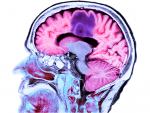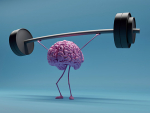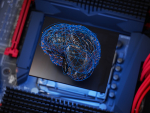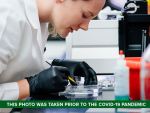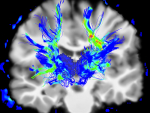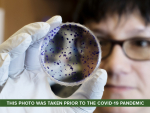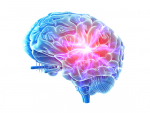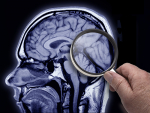Displaying items by tag: department of neurology
Tagged under
- release
- uab medicine
- uab hospital
- department of obstetrics and gynecology
- department of medicine
- division of clinical immunology and rheumatology
- department of physical medicine and rehabilitation
- division of otolaryngology
- division of cardiovascular disease
- division of cardiology
- division of cardiothoracic surgery
- department of surgery
- division of gerontology geriatrics and palliative care
- division of endocrinology diabetes and metabolism
- division of pulmonary allergy and critical care medicine
- oneal comprehensive cancer center
- department of neurology
- department of neurosurgery
- division of gastrointestinal sugery
All of the newly diagnosed glioblastoma multiforme patients enrolled in a Phase 1 clinical trial have exceeded both their median and expected progression-free survivals. Two patients, to date, have exceeded their expected overall survival.
Tagged under
Radiofrequency ablation precisely delivers heat energy that can destroy lesions within the brain that are the cause of seizures.
Tagged under
With the number of Americans with dementia expected to increase dramatically, UAB’s new brain health clinics point the way to improving brain health over a lifespan.
Tagged under
Adeel Memon will be the first graduate of the UAB neuroengineering Ph.D. program during the 2022 spring graduate commencement ceremony on April 29.
Tagged under
The investigational drug masitinib appears to inhibit parts of the immune system that may be overactive in ALS.
Tagged under
The fields of neuroengineering and brain-computer interfaces could have a tremendous impact on a number of neurologic conditions, such as stroke, neurodegenerative disorders, Parkinson’s disease, dementia and other brain diseases.
Tagged under
Consortium led by UAB researchers in the UAB Heersink School of Medicine and School of Public Health received additional funding to further study chronic hypertension and preeclampsia epigenetics participants enrolled in the CHAP trial.
Tagged under
Modeled on the state’s trauma system, the Alabama Statewide Stroke System will help improve emergency response for stroke patients.
Tagged under
The PPMI study is looking for biomarkers for Parkinson’s disease, which would help identify those at risk and track the progression of the disease.
Tagged under
Recent studies have shown that formal exercise training can help boost memory, and memory deficit is relatively common in people with epilepsy.
The grant links researchers from different disciplines, institutions and locations to study basic mechanisms that contribute to Parkinson’s disease.
Tagged under
Tagged under
The new grant links UAB researchers with colleagues at two other institutions to search for ways to advance therapies from bench to bedside.
Tagged under
Tagged under
- release
- advancement
- office of the president
- office of the provost for student and faculty success
- department of anesthesiology and perioperative medicine
- department of neurology
- department of biochemistry and molecular genetics
- department of cell developmental and integrative biology
- department of clinical and diagnostic sciences
- department of dermatology
- department of emergency medicine
- department of family and community medicine
- department of genetics
- department of medical education
- department of medicine
- department of microbiology
- department of neurobiology
- department of neurosurgery
- department of obstetrics and gynecology
- department of ophthalmology and visual sciences
- department of orthopaedic surgery
- department of otolaryngology
- department of pathology
- department of pediatrics
- department of pharmacology and toxicology
- department of physical medicine and rehabilitation
- department of psychiatry and behavioral neurobiology
- department of radiation oncology
- department of radiology
- department of surgery
- division of academic general pediatrics
- division of acute care surgery
- division of adolescent medicine
- division of advanced medical imaging
- division of anatomic pathology
- division of cardiothoracic surgery
- division of cardiothoracic anesthesia
- division of child abuse pediatrics
- division of clinical immunology and rheumatology
- division of community anesthesia
- division of diagnostic radiology
- division of developmental and behavioral pediatrics
- division of forensic pathology
- division of gastroenterology and hepatology
- division of gastrointestinal surgery
- division of general internal medicine
- division of general pediatrics and adolescent medicine
- division of genomics and bioinformatics
- division of gerontology geriatrics and palliative care
- division of gynecologic oncology
- division of hematology and oncology
- division of infectious diseases
- division of informatics
- division of laboratory medicine
- division of maternal fetal medicine
- division of molecular and translational biomedicine
- division of molecular imaging and therapeutics
- division of multispecialty anesthesia
- division of neonatology
- division of nephrology
- division of neuro oncology
- division of neuropathology
- division of pain medicine
- division of pediatric allergy and immunology
- division of pediatric hematology oncology
- division of pediatric cardiology
- division of pediatric critical care medicine
- division of pediatric dermatology
- division of pediatric emergency medicine
- division of pediatric endocrinology
- division of pediatric gastroenterology
- division of pediatric hospital medicine
- division of pediatric infectious diseases
- division of pediatric nephrology
- division of pediatric neurology
- division of pediatric oncology
- division of pediatric optometry
- division of pediatric pulmonary and sleep medicine
- division of pediatric rehabilitation medicine
- division of pediatric rheumatology
- division of pediatric surgery
- division of plastic surgery
- division of preventive medicine
- division of pulmonary allergy and critical care medicine
- division of reproductive endocrinology and infertility
- division of surgical oncology
- division of transplantation
- division of vascular surgery and endovascular therapy
- 1917 clinic
- acute care for elders unit
- addiction recovery program
- addiction recovery scholars
- alabama genomic health initiative
- all of us research program
- autism spectrum disorders clinic at uab
- center for addiction and pain prevention and intervention
- center for aids research
- center for clinical and translational science
- center for emerging drug discovery
- center for exercise medicine
- center for free radical biology
- center for interprofessional education and simulation
- center for genomic medicine
- center for low vision rehabilitation
- center for metabolic bone disease
- center for neurodegeneration and experimental therapeutics
- center for outcomes and effectiveness research and education
- center for palliative and supportive care
- center for pediatric onset demyelinating disease
- civitan international neuroimaging laboratory
- civitan international research center
- civitan sparks clinics
- comprehensive arthritis musculoskeletal and autoimmunity center
- comprehensive cardiovascular center
- comprehensive center for healthy aging
- comprehensive diabetes center
- comprehensive neuroscience center
- comprehensive stroke center
- comprehensive transplant institute
- deep south resource center for minority aging research
- gregory fleming james cystic fibrosis research center
- epilepsy center
- heflin center for genomic sciences
- hepatorenal fibrocystic diseases core center
- informatics institute
- institute for cancer outcomes and survivorship
- legacy of hope
- liver center
- lung health center
- mcknight brain institute
- minority health and health equity research center
- mucosal hiv and immunobiology center
- multiple sclerosis center
- national spinal cord injury statistical center
- nephrology research and training center
- obesity health disparities research center
- obrien center for acute kidney injury research
- pancreatobiliary disease center
- parkinsons disease information and referral center
- pediatric pulmonary center
- precision medicine institute
- primary care research collaborative
- spain rehabilitation center
- school of medicine
Limiting neuroinflammation may represent a promising new approach to treat neurological diseases driven by neuroinflammation, such as stroke, spinal cord injury and neuropathic pain.
Tagged under
Pharmacogenomics has become a valuable tool for optimizing treatments and is poised to play an increasing role in clinical care.
Tagged under
UAB is participating in a nationwide study to treat clinically depressed patients with a VNS device — originally created for treatment of seizure disorders.
Tagged under
New results suggest the answer is no, implying that the role of tau in the pathogenesis of Lewy body dementias is distinct from Alzheimer’s disease.
Tagged under
The first new medication for Alzheimer’s disease in almost 20 years seems to reduce the amount of amyloid peptide in the brain, which may slow the progression of the disease.
Tagged under

